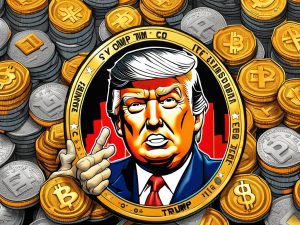Federal Bank Oversight Under Scrutiny: Is Change on the Horizon? 🤔
The potential restructuring of federal banking oversight is sparking significant discussions. The incoming administration of President-elect Donald Trump is considering the possibility of disbanding certain agencies like the FDIC. This initiative raises questions about America’s financial future. Will reducing oversight lead to progress, or could it endanger the stability of the banking system?
Understanding the FDIC’s Role and Its Importance 📈
The Federal Deposit Insurance Corporation (FDIC) plays a crucial role in the banking sector. It ensures the safety of deposits, providing a safety net for consumers in the event of a bank’s failure. Established after the economic downturn of the Great Depression, this institution was designed to restore public confidence in the financial system. Individuals need reassurance that their hard-earned savings are protected from unexpected bank closures.
The proposition to diminish such regulatory authority is certainly drastic. Throughout his initial presidency, Trump advocated for minimizing bureaucratic processes, arguing that excessive regulations hinder economic growth. His intention to remove the FDIC reflects a commitment to advancing blockchain technologies in the U.S. The administration contends that loosening regulations could enhance innovation, especially in sectors like cryptocurrency. While the FDIC’s role is to safeguard banks, it has increasingly shown skepticism towards digital currencies.
Are We Moving Towards a Cryptocurrency Future or Facing a Banking Crisis? 💡
Interestingly, Trump envisions a future where America spearheads the cryptocurrency movement. He sees potential in Bitcoin and blockchain technologies, believing that reducing federal oversight might facilitate growth for crypto startups and attract investors. His vision positions the U.S. to dominate the decentralized finance landscape, outstripping global competitors, particularly China.
However, resistance exists regarding the elimination of regulatory frameworks. Critics express concerns that dismantling such oversight could expose banks to greater risks, resulting in a loss of consumer trust regarding the safety of their finances. Supporters of cryptocurrency argue that its decentralized features might offer sufficient protection. The question remains: is this protection adequate for users?
Identifying the Potential Risks 🚧
The absence of the FDIC could pose severe challenges for traditional banking institutions. A decline in consumer confidence could create a precarious financial environment. For individuals, diminished protections might expose them to increased risks of fraud and asset loss. On the flipside, proponents of crypto view this situation as a gateway for Bitcoin expansion and blockchain advancements. This shift might attract global investors to pivot their interests toward the U.S. market, aligning well with Trump’s ambition to rejuvenate the nation’s economic standing.
Nonetheless, the path toward significant reform is complex. Legislative changes would require bipartisan support, and given the current political landscape, there could be substantial resistance. Financial analysts often point to the 2008 recession as a stark reminder of the potential dangers of deregulation. Historical events reveal that previous lapses in oversight had a profound impact—could we be on the brink of a similar crisis?
Looking Ahead: The Future of Financial Regulation 🌍
The proposed deregulation strategy put forth is undeniably ambitious. The essence of the plan revolves around minimizing bureaucratic barriers while banking on cryptocurrencies as the financial frontier of the future. However, with potential rewards come significant hazards. Will the U.S. emerge as the global leader in cryptocurrency, or are we paving the way for financial disarray? The upcoming months will determine if this bold vision cultivates substantial innovation or fosters instability in the financial marketplace.
Hot Take: The Decision Ahead 🧐
In this period of potential transformation in federal banking oversight, careful consideration of the risks and benefits is necessary. As the administration moves forward with plans that could significantly alter the regulatory landscape, the ramifications will likely be felt across the economy. Balancing innovation with consumer protection will be critical, and only time will illuminate the true impact of these proposed changes on America’s financial system.





 By
By
 By
By
 By
By

